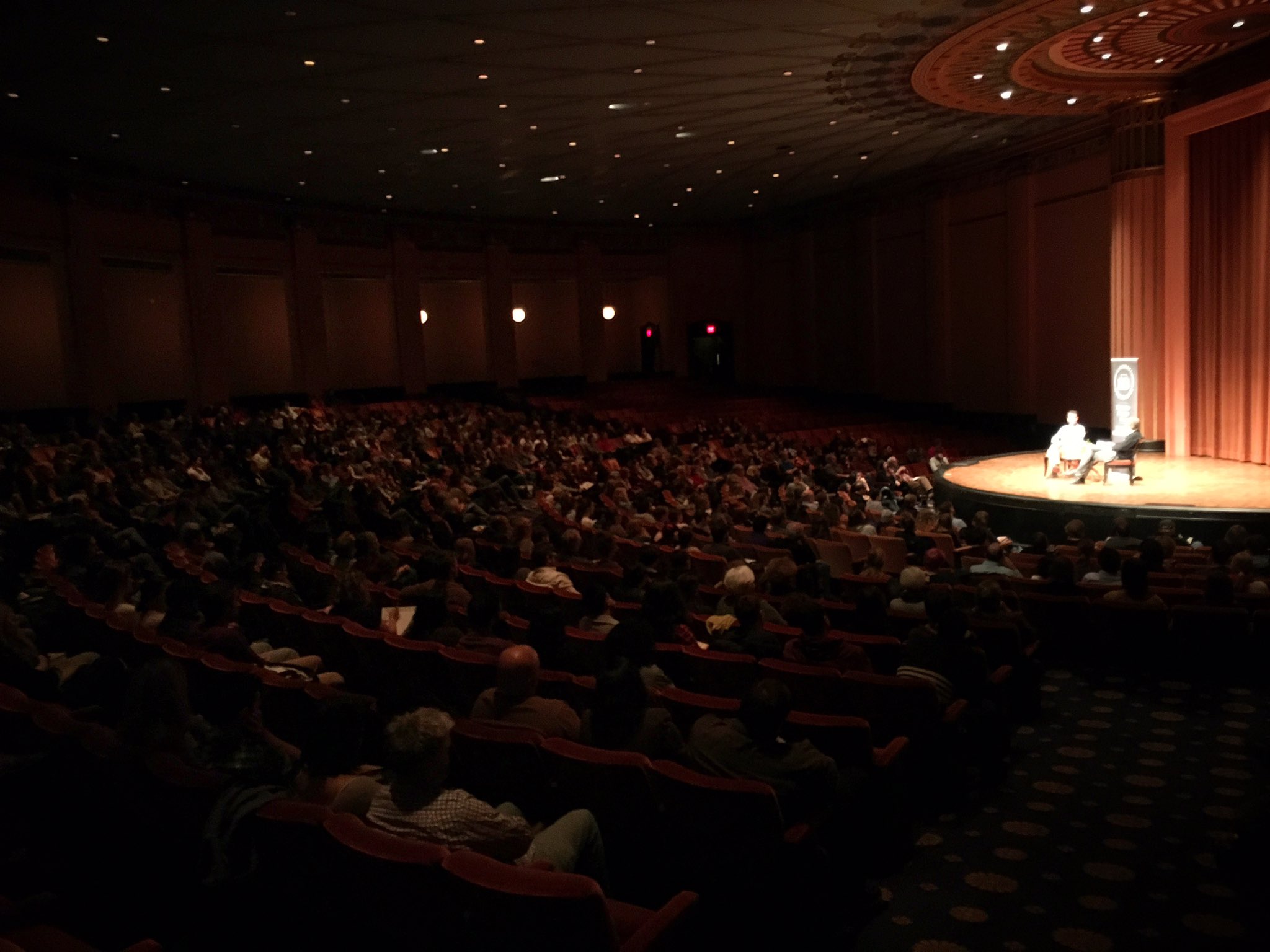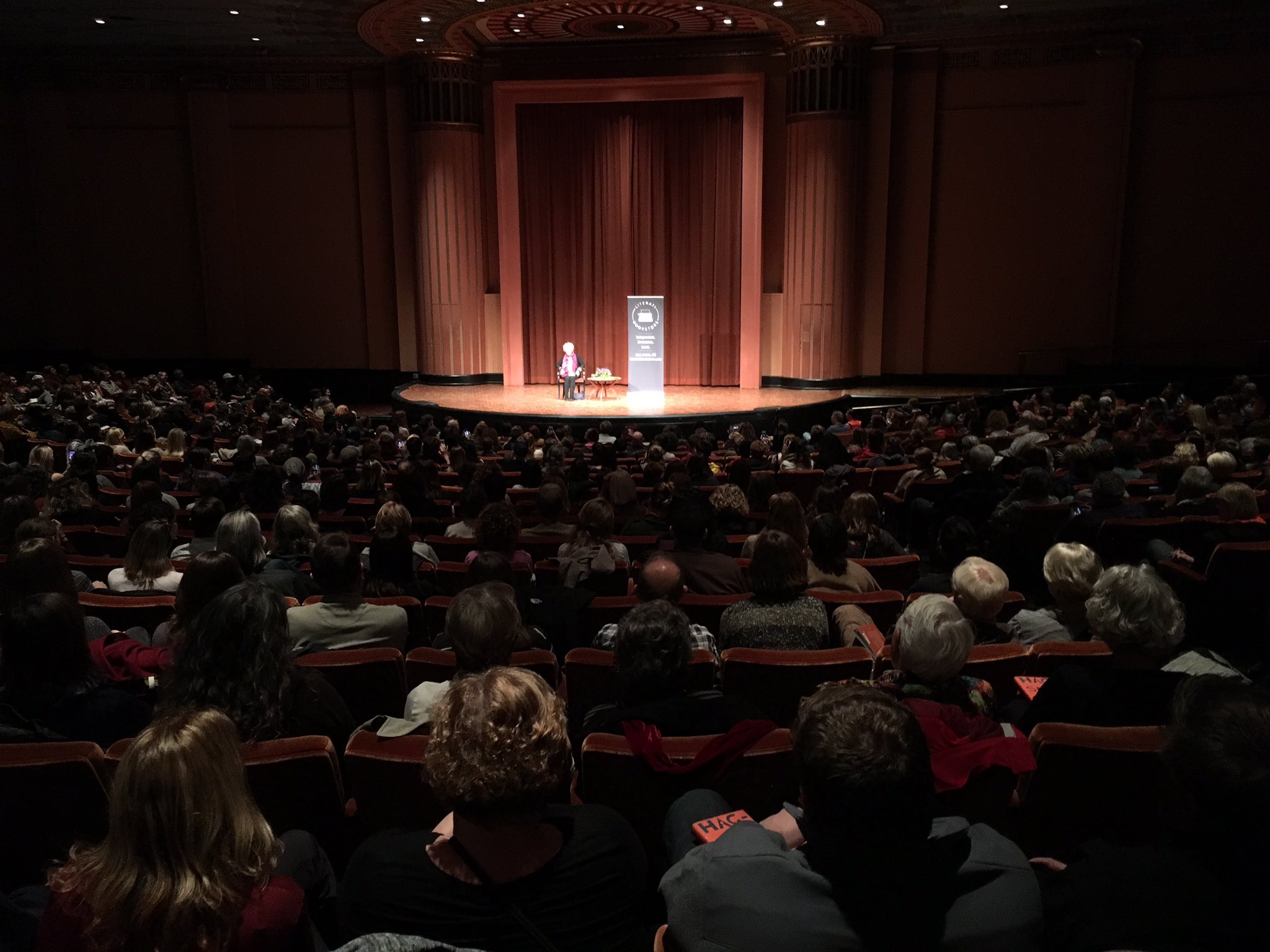Moonlight tells the story of a young man as he struggles to come to terms with his world and his sexuality. It has been getting excellent reviews (currently at a 98% on Rotten Tomatoes) and as can be seen from the trailer is a visually stunning film. It will be playing at the Michigan Theater this week and student tickets are $8.
Author: kjwuzhere
REVIEW: Jonathan Safran Foer Reading

Well, maybe, reading isn’t the most accurate word for it. After all, Jonathan Safran Foer read for a total of about five minutes (exactly two paragraphs). He explained that he hated readings and preferred conversations. Part of this is because he always has to figure out what to read and to whom. He described how he marked and labeled different sections for reading, and that half of these were “probably [about] jerking off,” which while that might make a great section for Ann Arbor, would probably not be so well-recieved in Nashville. The section he ended up reading was focused on the married couple who’s story makes up the heart of the novel. It included the wonderful line: “their inner lives were overwhelmed by all the living.”
The bulk of the evening was dedicated to the conversation with Douglas Trevor, though the conversational aspects were dubious. Jonathan Safran Foer had a habit of commenting halfway through a question and talking about whatever that half-question led him to. It didn’t seem necessarily that he was trying to lead the conversation in a certain direction or anything, more like he was too impatient to wait for the full question and he had to blurt out the ideas already forming in his head.
Still, the conversation turned out interesting at least. One of my, and I believe the rest of the audience’s, favorite parts was when JSF responded to a question about all the interesting tidbits of information and ideas placed in his novels, specifically, if he kept a scrapbook of such ideas to place in his works. JSF’s initial response was “I am never writing unless I’m writing,” which is very standard fare, but his answer continued on into further explanation, next describing how he doesn’t think. Like at all, or at least, unprovoked. He described his thoughts as responses–either to writing or conversation–and that when he is say, walking down the street, his mind is blank beyond basic feelings and thoughts (he wonders if anyone really thinks when they’re simply walking). This lack of thought has even led him to wonder if he really has feelings or if those are also just responses to stimuli. Needless to say, it was fascinating to listen to a world-renown author describe how few thoughts he has.
In response to another question, JSF described, rather beautifully, how when he is writing, no matter what he is writing, he feels that “this is the last thing you’ll ever write.” Not because he doesn’t plan on ever writing again obviously, but because “the person writing this book will not write another.” As in the sensibilities he has now will not be the same he has when he is older–looking back at his old work, he feels that these books were not written by him, as in current present JSF, but by a distinctly past version of himself. This makes sense given he wrote his first novel as a college student and his most recent one as a family man–people change, sometimes quite drastically.
In his Q&A with members from the audience, there was a question from one man which was prefaced by him stating that Jonathan Franzen was actually his favorite writer, to which JSF seemed a bit offended that this man would state that to him so matter of fact. When the man then attempted to backpedal by saying no disrespect, JSF said “respect is for losers.” He proceeded to answer the question somewhat adequately, but in a sense this interaction served as a summary of the entire night. Highly entertaining, kind of informative, not quite rude, but also just plain off.

PREVIEW: Jonathan Safran Foer Reading
Jonathan Safran Foer, author of acclaimed novels Everything is Illuminated and Extremely Loud & Incredibly Close, will be in Ann Arbor at Rackham Auditorium this Friday 11/4. He will be here promoting and reading from his latest novel Here I Am. Literati is hosting the event and the reading will be followed by a conversation with Douglas Trevor. Tickets must be purchased beforehand and are $12 for general admission, $32 for book bundle.

REVIEW: Train to Busan
What’s the deal with trains?
If you couldn’t figure it out from the title, Train to Busan is a movie that takes place on a train. Specifically, it’s a zombie movie that takes place on the train. When the movie ended, I was left wondering what exactly was it about trains that could make any movie, well, better. For if Train to Busan had taken place in a house or car or shopping mall, it would not have been quite as good. Furthermore, all of these train films are thrillers, when, in my experience, a train ride is anything but thrilling. Obviously, the setting shapes a film–but how exactly?

First off, there’s the constant motion. No matter what else is happening to the characters, they are always moving, something is always occurring. The plot is also tied up in this movement, for there is a destination and a timetable. Things must happen before you reach X or you will suffer the consequences of Y. Thus, there is both literal and figurative movement. This provides an easy source of intensity. In Train to Busan, utilizing this notion of plot-dependent-upon-destination, the film can be split into two parts. The earlier part is the train heading towards an intermediary city that seems unsafe and the later part is the train on its way to Busan. Here though, the movie deviates from conventional train movies, for what is important is not that they do X before reaching their destination, but that they survive on board long enough to reach said destination.
Movement, of course, is not unique to trains. Cars, planes, bikes, buses, and simple walking are all methods of getting from point A to point B. But not all movements are equal. Trains are not personal transportation–they are public, and with that, a larger and more varied cast of characters can be devised. After all, these people do not have to know one another nor like one another, and in fact, their dislike is often a path for tension and character development. For example, the cast of characters in Train to Busan is not restricted to a single family; instead, we have a single father, his daughter, a young high school couple, two elderly sisters, a selfish CEO, a young husband, his pregnant wife, and several employees of the train company. There are no established relationships among these different sets of characters and part of the plot is watching them learn how to work together (or against one another) to survive the zombies also on board with them. While other vehicles for travel allow strangers to similarly come together, such as planes and buses, these methods have much smaller space to work with. A train can be quite lengthy, but airplanes remain rather limited. We want the space the characters have to work in to be constrained, but not too constrained, otherwise we lose the ability to have well-choreographed fighting scenes.

Finally, there are several unique elements that trains alone possess. There’s the separate compartments which allow different ideas and challenges to manifest in different carts (for example, in Train to Busan a compartment of high school baseball players has significance) thus breaking the monotony of fight scenes and travel between them. Tunnels, objects blocking the tracks, and train stations are all elements made use of in Train to Busan and other train-oriented films. By using the uniqueness of trains, an otherwise standard zombie film has doubled down terror and action.
If you’re interested, Train to Busan will be playing again at the Michigan Theater at 7:00pm Tuesday.

REVIEW: Margaret Atwood Reading
The doors to Rackham Auditorium opened at 6:15 and the reading did not begin until 7:00, but by 6:00 people had already filled the lobby of Rackham. I was aware that this event had sold out, but I only realized the magnitude of this upon entering the auditorium. More than 1,000 people had bought tickets to attend this event–placing it among the larger readings that have taken place in Ann Arbor.
After an introduction by one of Literati’s booksellers, Margaret Atwood came on stage wearing darling skeleton gloves, quipping that they were in honor of our upcoming election. She was here to promote her latest book, Hag-Seed, which is a part of the Hogarth Shakespeare project. Before she read, she explained to us the stages of writing for a project likes this: rash acceptance, buyer’s regret, procrastination, and panic. Interestingly enough, those are the same stages I’m going through while writing this review. However, unlike Atwood, I haven’t been tasked with translating a Shakespeare play (in this case, The Tempest) to novel form.
The book follows Felix, who was a director at a proper theater before being fired and forced to take up a job directing plays in men’s prison. The first scene Atwood read was one describing Felix as he tries to convince an actress to play the part of Miranda in the prison’s production of The Tempest. It was a rather humorous section and showcased Atwood’s wit, but me pulling a line or two from it won’t do the reading justice so I’ll refrain. They’re funny, but only in context. The other section she read was one where one of the prisoners has come to Felix about a rather dry part of the play with some changes he made. What followed was Atwood dryly reading a rap version of the speech Prospero makes in Act 1 Scene 2 of The Tempest, including all claps and snaps. It was not a half-assed section either–Atwood didn’t write a few lines for this rap and move on, though she probably could have gotten away with that. No, she rewrote Prospero’s speech in its entirety and proceeded to read all of it. I can only hope that at some point someone records her reading this rap and leaks it to the internet, because the world deserves to listen to a little ole’ Margaret Atwood read a Shakespearean rap.
Once the reading was over, there was a question and answer section with the audience, which Atwood prefaced with a “if I don’t like your question, I will reformulate it.” Atwood seemed familiar with the questions asked (when do readers ever ask new or interesting questions about books written 20+ years ago?). For example, the first question was about whether The Handmaid’s Tale is intentionally cautionary. To this Atwood broke down the the three backgrounds that led to the book: first, there had been a number of mid-century dystopias, none of which had been written from a female point-of-view; second, it was the Puritans who had laid the foundation for America, not the Founding Fathers, and that none of the events/rules/ways of life in the book were Atwood’s own invention, they had all happened some place, some time; and finally, that the time the book was written, the 1980s, was already seeing the rise of some of this way of thinking, of the religious right, of women who made a living telling other women they should not have jobs and stick to managing their homes. Another audience member asked a question about why Atwood chose to write genre books when she was also a literary author. It was clearly a question Atwood was sick of for she seemed to almost bat it down, stating that she didn’t divide books by genre, but “what I like” and “what I don’t like.” Furthermore, in reference to what she writes about, she said “I did those things because it never occurred to me not to do them.” There were several other questions, ranging from “why is reading important” to “have you scripted the current US election” (she has not), and all in all, it was a lengthy, interesting q&a section. Atwood isn’t just a good author, she’s also a good thinker and one of the more witty writers around. If you are ever given the chance to hear her read or talk–take it.


PREVIEW: Train to Busan
If you’re up for some pre-Halloween gore, head on over to the Michigan Theater this weekend, where acclaimed Korean zombie-thriller, Train to Busan will be playing. Follow a young father as he tries to keep his daughter safe in the middle of a zombie outbreak. It currently has a 94% on Rotten Tomatoes, so if you’re looking for a quality thriller, this is it. Student tickets are $8 at the Michigan Theater and the film has two showings on Saturday (2:30 & 10:15), one on Sunday (4:00), and one on Tuesday (7:00).

